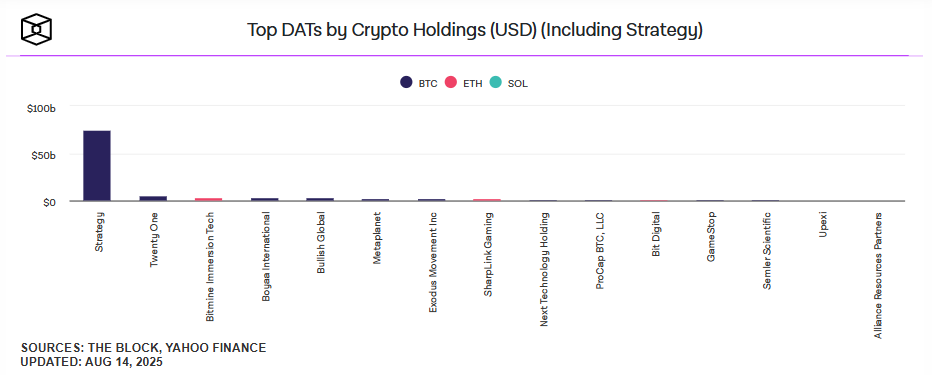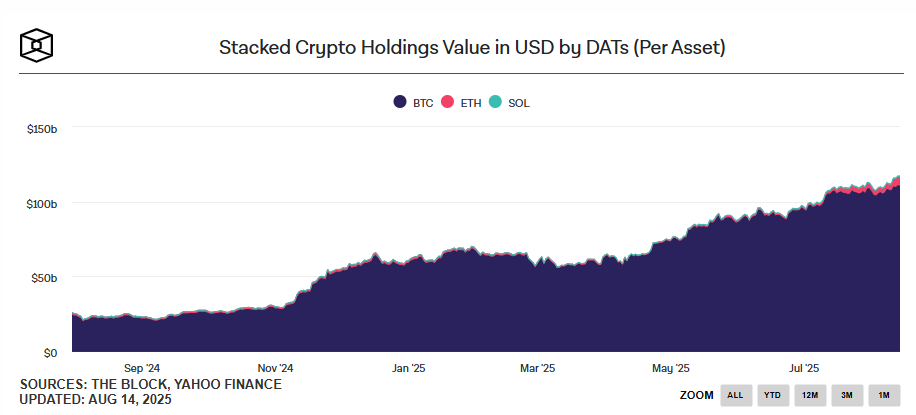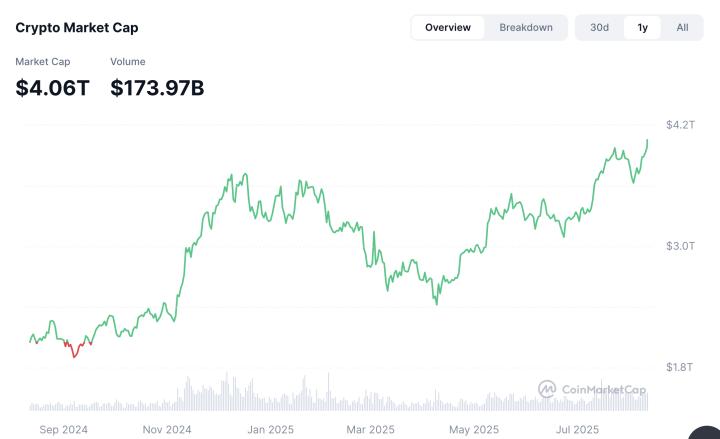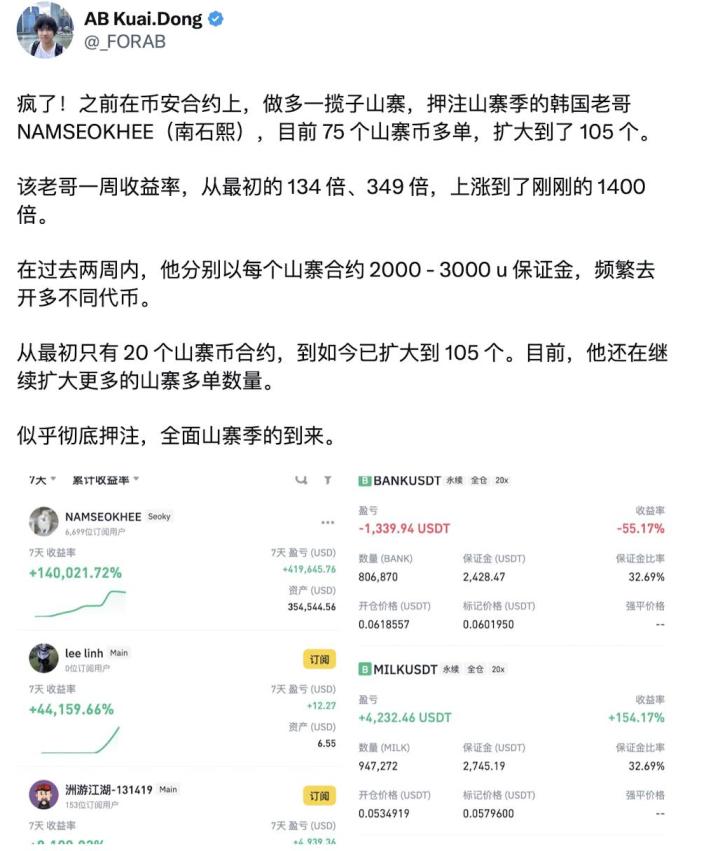Author: RT Watson
Translated by: TechFlow
Quick Overview
Altcoin digital asset treasuries (DATs) are raising billions of dollars from investors, aiming to promote specific tokens while generating profits through listed companies.
Supporters believe DATs will enhance token visibility, drive widespread adoption, and generate returns; critics argue this model may signal a worrying trend of major holders quietly planning to cash out.
Digital Asset Treasuries (DATs) have become one of the most controversial trends in the crypto industry. Supporters argue they can drive token adoption and bring substantial returns, while critics are concerned the model may suggest major holders are quietly planning to exit.
With billions of dollars flowing in, notable figures like Donald Trump, CZ, and Justin Sun have all been involved.
Brian Rudick, Chief Strategy Officer of Solana treasury company Upexi, is one of the staunch supporters of DATs.
In an interview with The Block, Brian Rudick stated: "Digital asset financial companies are mostly one-way acquisition tools that can drive up token prices, attracting users, developers, and decentralized applications (dApps). They can significantly enhance the token ecosystem's visibility, especially among traditional investors and institutions."
The DAT concept can be traced back to Michael Saylor's decision five years ago. At the time, he transformed his publicly listed software company MicroStrategy (now renamed Strategy) into a Bitcoin accumulator. After Bitcoin's significant price increase, especially by the end of last year, Strategy's shareholder value grew exponentially. The company's Bitcoin-centric strategy transformation suddenly seemed incredibly wise, and Strategy's success inspired imitation in the crypto realm.

Image source: The Block Data.
[The translation continues in the same manner for the entire text, maintaining the specified translations and preserving the original structure.]About two weeks before the announcement of transformation, Sonnet's stock price had been hovering between $1.00 and $1.50 throughout the year. Afterward, its stock price began to rise after the company sold convertible bonds worth $2 million to specific qualified investors. With increased trading volume, Sonnet's stock price surged over 300%. Subsequently, according to Yahoo Finance, its stock price soared to nearly $10 after the company announced a shift to the HYPE treasury.
Paradigm co-founder Matt Huang stated on the day of the announcement: "We have heard significant institutional investment demand for Hyperliquid, but the native token HYPE is difficult to acquire in the United States. We are very excited about this fund management strategy and believe that over time, it will contribute to the Hyperliquid ecosystem in multiple ways."
In the mid-July announcement, companies disclosed that the DAT is expected to hold approximately 12.6 million HYPE tokens, valued at around $583 million at spot prices. However, the new ownership structure of this DAT appears quite complex: Sonnet merged with Rorschach I LLC, a new entity jointly established by Atlas Merchant Capital LLC, its affiliated companies Paradigm, and other sponsors.
Currently, Rorschach owns 98% of Sonnet (now renamed Hyperliquid Strategies). Institutions such as Galaxy Digital and Pantera Capital also participated in the creation of this DAT.
In such transactions, significant stock price increases before announcements may further reinforce external suspicions of potential unfair insider gains.
Komoto CTO Kadan Stadelmann, in an interview with The Block, commented on these DAT transactions related to founders and major holders: "This closed-loop economy phenomenon will provide discussion topics for crypto skeptics for years."
Komoto CTO Kadan Stadelmann offered sharp criticism of crypto treasury operations. He stated: "When treasury companies buy tokens from VCs or foundations that these VCs already hold, it's not asset management, but creating exit liquidity. It's a self-trading behavior disguised as capital deployment."
Paradigm declined to comment, and representatives of Hyperliquid Strategies have not responded to requests for comment.
In contrast, Alluvial CEO Mara Schmiedt expressed a more optimistic view. She believes that crypto projects transitioning to publicly listed companies is an opportunity to enhance accountability.
In an interview with The Block, she stated: "Publicly registered companies must comply with strict disclosure requirements and are expected to maintain robust conflict of interest policies. When these entities participate in crypto treasuries, the sense of responsibility they bring can set higher standards for the entire ecosystem."

Image source: The Block Data.
"Insider Trading is a Criminal Act"
The recently established SUI treasury company seems to be working to shape a story that investors can trust.
"Insider trading is a crime," said Stephen Mackintosh, Chief Investment Officer of Mill City Ventures, in an interview with The Block. He added that the SUI-focused DAT he supports did not purchase any locked tokens from investors hoping to exit early.
In late July this year, Nasdaq-listed short-term non-bank lending company Mill City Ventures transformed into a SUI treasury strategy through a $450 million private placement. In addition to becoming part of Mill City's new leadership team, Mackintosh is also a co-founder of London hedge fund Karatage, which was the lead investor in this private placement.
Mackintosh revealed that Mill City has reached an agreement with the SUI Foundation to purchase SUI tokens at a discount, but so far, the discount seems quite small, especially compared to transactions with World Liberty and TON Strategy.
This week, the SUI treasury company announced the acquisition of approximately 5.6 million SUI tokens at an average price of $3.65, bringing its total holdings to nearly 81.9 million tokens. This price is only slightly lower than the previous day's trading range of $3.80 to $3.90.
Mackintosh maintains long-term connections with the SUI Foundation and developers of the underlying technology, Mysten Labs. He stated that his team's shares will be locked for 12 months to demonstrate their long-term investment commitment to the "SUI community, investors, and shareholders". Meanwhile, he revealed that tokens purchased by the treasury from the SUI Foundation will be locked for about two years.
"We believe SUI assets will achieve compound growth in the next 10 years," Mackintosh said. "This is exactly what Michael Saylor proved - you need to buy scarce assets"
Update: Removed mentions of unnamed "sponsors" in Hyperliquid Strategies and clarified that institutions like Galaxy Digital and Pantera Capital participated in the creation of this treasury. Additionally, more details were added about Sonnet BioTherapeutics' stock accumulation before announcing the HYPE funding strategy.







